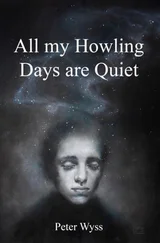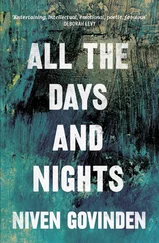Луис Бегли - All Saint's Day
Здесь есть возможность читать онлайн «Луис Бегли - All Saint's Day» весь текст электронной книги совершенно бесплатно (целиком полную версию без сокращений). В некоторых случаях можно слушать аудио, скачать через торрент в формате fb2 и присутствует краткое содержание. Жанр: Проза, short_story, на английском языке. Описание произведения, (предисловие) а так же отзывы посетителей доступны на портале библиотеки ЛибКат.
- Название:All Saint's Day
- Автор:
- Жанр:
- Год:неизвестен
- ISBN:нет данных
- Рейтинг книги:4 / 5. Голосов: 1
-
Избранное:Добавить в избранное
- Отзывы:
-
Ваша оценка:
- 80
- 1
- 2
- 3
- 4
- 5
All Saint's Day: краткое содержание, описание и аннотация
Предлагаем к чтению аннотацию, описание, краткое содержание или предисловие (зависит от того, что написал сам автор книги «All Saint's Day»). Если вы не нашли необходимую информацию о книге — напишите в комментариях, мы постараемся отыскать её.
All Saint's Day — читать онлайн бесплатно полную книгу (весь текст) целиком
Ниже представлен текст книги, разбитый по страницам. Система сохранения места последней прочитанной страницы, позволяет с удобством читать онлайн бесплатно книгу «All Saint's Day», без необходимости каждый раз заново искать на чём Вы остановились. Поставьте закладку, и сможете в любой момент перейти на страницу, на которой закончили чтение.
Интервал:
Закладка:
Jake had interested me ever since we met some years back, when I thought he might open for me a window on certain aspects of New York life. There must have been a budding sympathy on his part as well because, just as we were about to separate at 57th Street, he suggested in his quiet, offhand manner that there was no reason why we shouldn’t walk together regularly, since apparently we adhered to the same schedule. Some days later he went further, suggesting that in bad weather he would be happy to give me a ride. The driver would pick me up at my address in the Nineties, then collect Jake and let him out at the Lever Bros. building, and finally deposit me at my office. I was surprised by both the precision and the generosity of this proposal, and told him so. He laughed, and said that secretly he was an enthusiast and an activist. You mustn’t think that I want to impose on you another obligation when you surely have so many; he added, Let’s see how the system works. After having had my company for a while you may decide that you would do anything to escape: change your route to Madison Avenue or Fifth, perhaps even take the subway or the bus!
I didn’t tire of Jake. Instead, my curiosity turned into genuine fondness. It was a dry and very pleasant autumn so that, with one or two exceptions, we were able to enjoy our morning walks. I noticed in the course of our peregrinations that Jake always slowed down to gaze at the building at 66th Street. He also cast long and sometimes intense looks at certain other buildings on the west side of the Avenue. Soon, I had an inventory: the tawny building at the corner of 76th Street; the fraternal twin buildings on the northwest and southwest corners of 73rd Street with complicated terraces and setbacks at the highest floors; on the block between 71st and 70th Streets, a second set of twins resembling the first pair; at the northwest corner of 67th Street, towering above the Pratt Mansion, a severe and unadorned sandstone limestone structure; and finally, that building at 66th Street. We were getting along so well that on one of our morning walks I was bold enough to ask: Why do you look each time you pass with such intensity at those same buildings — I identified them — on the other side of the Avenue? Have you made it your habit to walk on this side so as to get a better view?
Jake smiled. It was an interesting coincidence, he told me, that I should have put the question on the first day of November, which is All Saints’ Day, since the homage he paid by fleeting glances was his way of visiting certain graves. Someone important to me had lived in each of those buildings, he explained, but the persons in question are dead or, in one case, utterly lost. There is another reason for walking on the east side of Park, he added more cheerfully. One is spared the wretched view of Lenox Hill Hospital and Hunter College. When we reach them, I just look straight ahead.
The answer intensified my curiosity. I asked whether he would tell me about the former inhabitants of these mausoleums.
Certainly, said Jake. My feelings are not very profound, except for one case, which is special. Mostly it’s nostalgia for vanished friends and pleasures. For instance, in what you have called the tawny building lived an elderly childless couple, friends of my parents, possessed of remarkable eighteenth-century French furniture. Their apartment was on the third floor, not really for the sake of lower maintenance charges, although being miserly the husband surely derived pleasure from not paying as much as the occupants of the apartments on the high floors, but so as to avoid having their treasures bleached by sunlight. For greater safety, the curtains were almost always drawn. A profusion of lamps and sconces relieved the gloom, bathing in pink glow sofas, settees, armchairs, side tables, étagères, escritoires, bibelots, and curios the pair had collected. Most of these objects are at the Metropolitan Museum, to which they were bequeathed. I linger among them often, remembering the apartment and the old couple’s receptions. They were fond of festivities and had the intelligence to invite young people to stir things up a little and bring the average age of the guests below seventy. The husband used to say he’d do anything and invite anyone so that these gatherings, once they sat down to bridge and canasta, didn’t look like the social hour at a home for old Jews. The goulash, Taffelspitz, and Sacher chocolate cake they served were astonishing; I haven’t eaten better even at the Rote Bar of the Sacher Hotel itself. The old couple was Viennese; they and their friends had been rich and shrewd enough to get out of Central Europe with a good part of their money and valuables ahead of the Germans. They made more money in the New World and had good lives, but without exception, they made me think of amputees: the old life from which they had been severed was, for all its humiliations, one they missed and yearned for. When they talked about it, perhaps because the accents had their own aroma as irresistible as that of the buffet table, you were transported into movie land, Rick’s Café in Casablanca and The Third Man .
The other memories are darker, Jake told me. For example: in one of the buildings topped by what I call the hanging gardens of Babylon, lived the mother of a friend who was also my college classmate. The terrace wrapped around the first floor of her duplex and was accessible from most rooms. My classmate was her older son. She began to give annual May parties out on that terrace for his friends — and the friends of his friends — a year after he and his guide were killed in a climbing accident in the Andes. That was during the summer after graduation. It was a freak accident, like all accidents, Jake told me, because his classmate was an experienced climber who had made the ascent successfully once before; the guide was widely understood to be the best; and the weather had been perfectly normal for that time of the year, without any sudden storms or other problems. Just what had happened never became clear; there were no other climbers in the vicinity. Then, her younger son was lost at sea, in brutal weather between the Cape Cod Canal, through which he had already passed, and Portland, Maine, where he was taking his boat for the winter. Wreckage of the boat was found, but not the body. That left the old lady as the sole survivor of the family, the collaterals being very distant. I should have told you at the outset, said Jake, that she brought up the boys alone. Her husband was killed by a polo ball that hit him on the forehead one month after the younger son was born. She gave those parties right up to her death, thirty-five years after the climbing accident. Meanwhile, not a few of us — I mean the group that had come to them at the start — had died. Many had divorced and remarried. She invited the new wives and continued to invite the discarded ones if they had not moved away from New York. And we kept on showing up — some, like me, without fail — though often considerably changed, sometimes atrociously. You can imagine it. Vast expansions of girth, normally attractive faces turning various shades of purple or violet, the usual loss of hair in the case of men and in the case of wives baldness brought on by chemotherapy. Our hostess hardly changed at all, except that gradually she shriveled. Then one day, her lawyer telephoned to say she was dead. She fell down the stairs of her duplex presumably during the night, landing headfirst on the marble floor of the foyer. The skull was cracked. The cook found her in the morning. I thought he was going to ask me to speak at the service, there being no one else still alive who knew her as well, but he told me that he would deliver the eulogy himself.
They are mostly like that, said Jake, my other stories. Straightforward tales of unavoidable loss. Sometimes, when I walk down Park Avenue, the weight of memories is such I think I have lived one thousand years, maybe longer.
Читать дальшеИнтервал:
Закладка:
Похожие книги на «All Saint's Day»
Представляем Вашему вниманию похожие книги на «All Saint's Day» списком для выбора. Мы отобрали схожую по названию и смыслу литературу в надежде предоставить читателям больше вариантов отыскать новые, интересные, ещё непрочитанные произведения.
Обсуждение, отзывы о книге «All Saint's Day» и просто собственные мнения читателей. Оставьте ваши комментарии, напишите, что Вы думаете о произведении, его смысле или главных героях. Укажите что конкретно понравилось, а что нет, и почему Вы так считаете.










